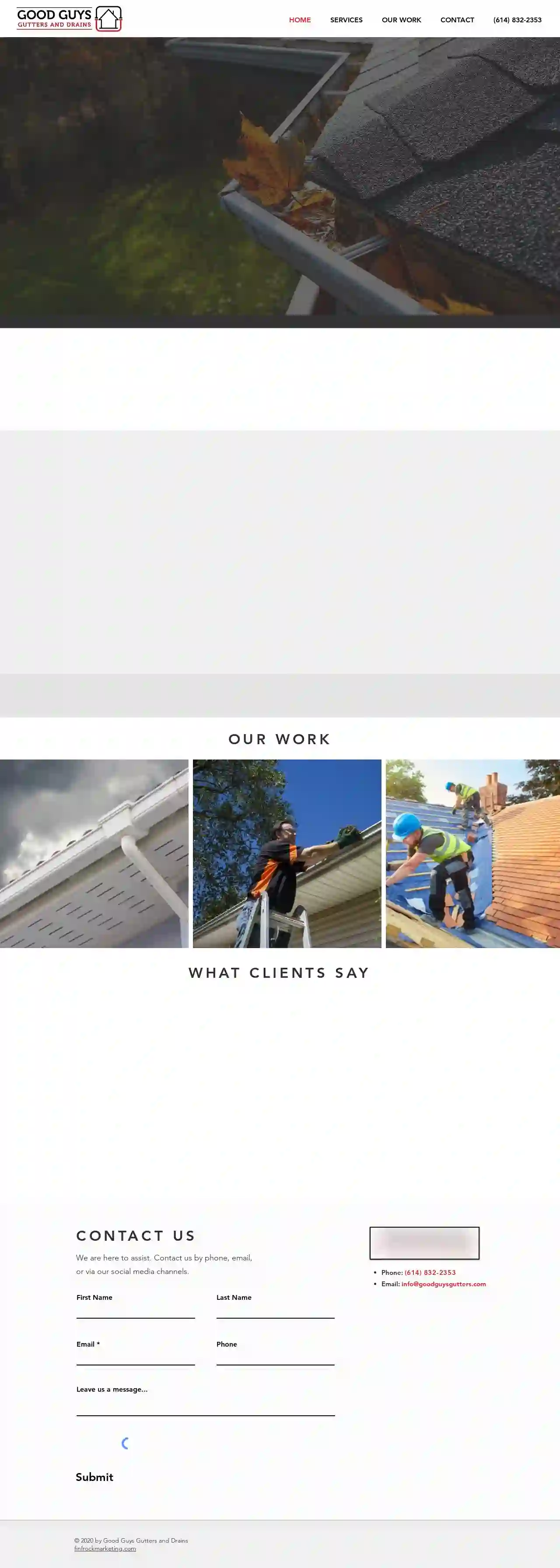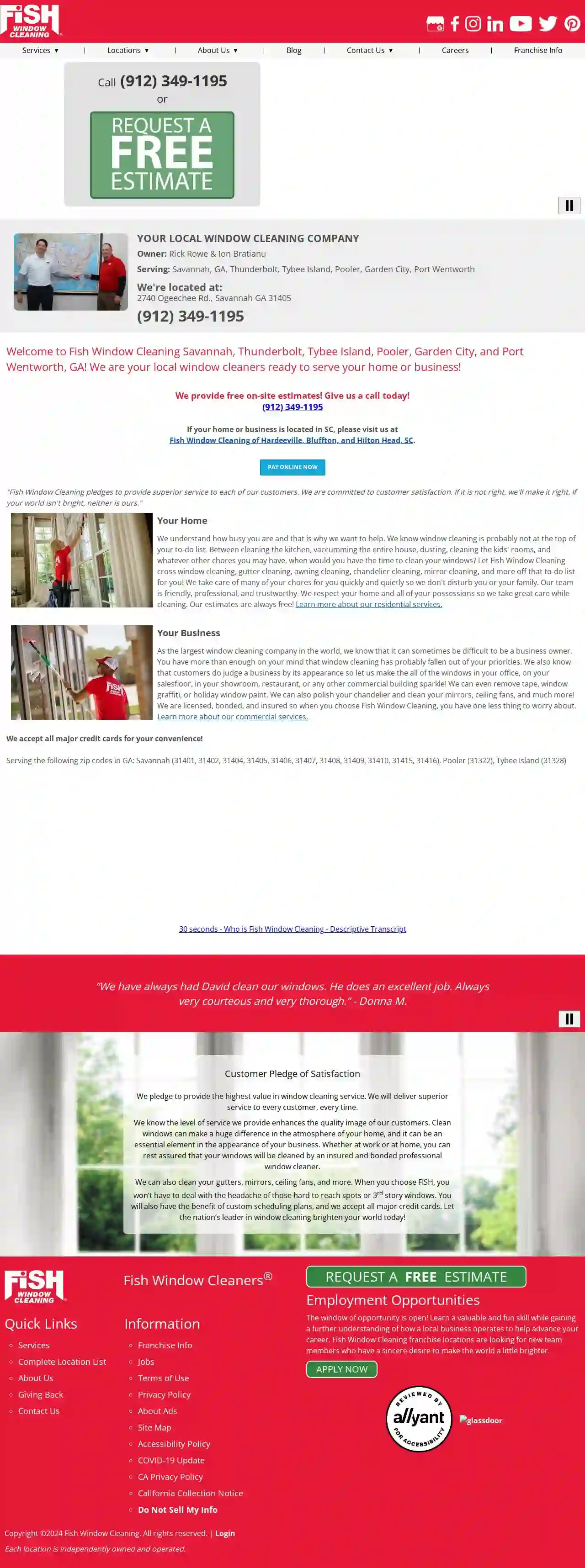Gutter Cleaning Lithia Springs
Find Gutter Cleaning in Lithia Springs
Get 3 FREE Gutter Cleaning and Repair quotes for your project today! Compare profiles, reviews, accreditations, portfolio, etc... and choose the best service.

Residential Aspects Gutter Cleaning Services
48 reviewsColumbus, USResidential Aspects is the premier provider of gutter services who serves all of Franklin County, Ohio including Columbus, Dublin & Westerville, Ohio. We also provide gutter cleaning services throughout Columbus, Ohio and surrounding cities including Powell, Ohio. Our first step is providing a free estimate on cleaning your gutters and downspouts of your gutter drains on your Columbus, Ohio home. After this cost of service is approved, we schedule the gutter cleaning job. Once we arrive to your Columbus, Ohio home, we will greet and answer any questions or concerns you may have prior to starting. You Can Get Your Free Estimate Here. If you are seeking more then a one time service call for gutter cleaning checkout here for more information on discounted service calls for recurring gutter and downspout cleaning services.
- Services
- Why Us?
- Accreditations
- Our Team
- Testimonials
- Gallery
Get Quote
Good Guys Gutters and Drains
4.979 reviewsColumbus, USGood Guys Gutters and Drains is a full-service gutter and drain company that has been serving Columbus, Ohio and surrounding communities since 2001. Our goal is to provide quality work at affordable prices!
- Services
- Why Us?
- Testimonials
- Gallery
Get Quote
Atlanta Gutter Specialists
55 reviewsAtlanta, USAtlanta Gutter Specialists is a top-rated gutter company in Atlanta, GA, providing professional same-day service by trusted local technicians. We offer a range of services, including gutter repair, gutter installation, gutter guards, and gutter cleaning. Our goal is to ensure your home is free of water damage caused by your rain gutters. Contact us today at 877-714-5812 to learn more about our services or to schedule an appointment.
- Services
- Why Us?
- Gallery
Get Quote
Georgia Premium Cleaning
4.541 reviewsAtlanta, USGPC Georgia Premium Cleaning is your go-to provider for top-notch Window Cleaning, Pressure Washing, Gutter Cleaning, and both Commercial and Residential Cleaning services in Georgia. We pride ourselves on being the best in the business, offering a hassle-free experience that saves you time and effort. Our team is dedicated to providing quick, reliable service with excellent communication and competitive pricing. Ready for a sparkling clean home or business? Simply provide your name, phone number, address, and a brief description of your cleaning needs, and we'll get back to you within 1-3 hours with a free quote.
- Services
- Why Us?
- Testimonials
- Gallery
Get Quote
ZML Exterior Home Care
549 reviewsAugusta, USZML Exterior Home Care LLC is a locally owned and operated company that provides various home exterior services, including house washing, driveway cleaning, roof cleaning, and even tree removal for residential and commercial locations. Owner Zach, a hands-on individual, believes in providing the highest quality materials, workmanship, and service on every job. He is present on every job to ensure that the work meets these high standards. Your satisfaction is their top priority, which is why their company slogan is “Where we treat your home, like our home.”
- Services
- Why Us?
- Our Team
- Testimonials
- Gallery
Get Quote
BC Gutters
4.958 reviews104 Calle Mayor Street, Warner Robins, 31088, USBC Gutters is a family-owned and operated gutter installation company that started in 2023. With deep roots in Warner Robins, we take pride in establishing a trusted name for gutter services in Warner Robins and the surrounding area. Our core values revolve around integrity, excellence, and customer satisfaction. We are committed to delivering quality results on every project, backed by our team's 20+ years of gutter installation and maintenance experience. We believe in building lasting relationships with our customers through transparency, open communication, and top-tier service. Your home's protection is our priority, and we go the extra mile to ensure your gutters function flawlessly.Thank you for considering BC Gutters for your gutter needs. We look forward to working with you and exceeding your expectations with our exceptional services.Call us for gutter install anywhere in Bonaire, Kathleen, Centerville, Byron, Warner Robins, Fort Valley, Perry or Macon!
- Services
- Why Us?
- Gallery
Get Quote
Wilson Exterior Cleaning
5269 reviewsGainesville, USWilson Exterior Cleaning was founded in Gainesville, Florida in 2015. We specialize in Pressure Washing or Power Washing and Soft Wash Roof Cleaning. For a fast estimate please email us at [email protected] - with the address and details of the work to be completed. Soft wash roof cleaning is achieved using a 12V electric pump and will leave your roof looking brand new without the damage that is caused by a pressure washer. We keep your plants safe during the process. Our services include house washing, soft wash roof cleaning, pressure washing, power washing, pool deck/pool screen cleaning, rust removal, concrete cleaning, driveway/walkway/garage floor cleaning, decks/fences washing, gutter cleaning. Free estimates. We carry workers' compensation insurance and general liability insurance. Commercial and residential. Please submit your information on our website, email, Call or Text us at 352-448-1499. Formerly known as Premium Power Washing, Wilson Exterior Cleaning has been serving Gainesville and many surrounding areas since 2015. Our experts use the best equipment and systems to thoroughly clean any surface without any damage to delicate surfaces like roof shingles or wooden decks and fences. As an owner operated business, Wilson Exterior Cleaning is able to provide customers with top quality service and complete customer satisfaction. You can rely on us as your professional solution for all your exterior cleaning needs in Florida. From pressure washing to soft wash roof cleaning, commercial and residential. Don't delay any longer! Have your property cleaned today! Call us anytime at 352-448-1499 for your FREE ESTIMATE for all of your Florida pressure washing and Florida Soft wash roof cleaning needs
- Services
- Why Us?
- Gallery
Get Quote
The Heart of Georgia Gutter Solutions
12 reviewsMacon, USThe Heart of Georgia Gutter Solutions aims to connect you with contractors who specialize in professional, skillful, and efficient gutter cleaning and installation services in the greater Macon, Georgia area to ease your life. Our knowledgeable partners stay updated with the latest gutter cleaning techniques and contemporary gutter installation materials to keep their promise of quality services. Because your Macon home or business gutters play a role in maintaining your property, our network of contractors ensure it functions optimally. If you frequently experience gutter obstruction, perhaps an underlying cause promotes the problem. Our partners inspect your property to unleash the culprit and fix the hidden issues to ensure future safety. Apart from gutter cleaning, our providers also offer professional gutter installation services for residential and commercial properties in Macon. So, if you moved in recently, do not wait for the rain to seep into your property. Instead, take action on time and reach out for a quick and straightforward gutter installation. Make sure you get the debris and water out – before it gets in – call us today to speak to one of our gutter partners!
- Services
- Why Us?
- Gallery
Get Quote
Fish Window Cleaning
4.85 reviews2740 Ogeechee Rd., Savannah, 31405, USOwner: Rick Rowe & Ion Bratianu Serving: Savannah, GA, Thunderbolt, Tybee Island, Pooler, Garden City, and Port Wentworth We're located at: 2740 Ogeechee Rd., Savannah GA 31405 (912) 349-1195 Welcome to Fish Window Cleaning Savannah, Thunderbolt, Tybee Island, Pooler, Garden City, and Port Wentworth, GA! We are your local window cleaners ready to serve your home or business! We provide free on-site estimates! Give us a call today! (912) 349-1195 If your home or business is located in SC, please visit us at Fish Window Cleaning of Hardeeville, Bluffton, and Hilton Head, SC. "Fish Window Cleaning pledges to provide superior service to each of our customers. We are committed to customer satisfaction. If it is not right, we'll make it right. If your world isn't bright, neither is ours." Your Home We understand how busy you are and that is why we want to help. We know window cleaning is probably not at the top of your to-do list. Between cleaning the kitchen, vaccumming the entire house, dusting, cleaning the kids' rooms, and whatever other chores you may have, when would you have the time to clean your windows? Let Fish Window Cleaning cross window cleaning, gutter cleaning, awning cleaning, chandelier cleaning, mirror cleaning, and more off that to-do list for you! We take care of many of your chores for you quickly and quietly so we don't disturb you or your family. Our team is friendly, professional, and trustworthy. We respect your home and all of your possessions so we take great care while cleaning. Our estimates are always free! Learn more about our residential services. Your Business As the largest window cleaning company in the world, we know that it can sometimes be difficult to be a business owner. You have more than enough on your mind that window cleaning has probably fallen out of your priorities. We also know that customers do judge a business by its appearance so let us make the all of the windows in your office, on your salesfloor, in your showroom, restaurant, or any other commercial building sparkle! We can even remove tape, window graffiti, or holiday window paint. We can also polish your chandelier and clean your mirrors, ceiling fans, and much more! We are licensed, bonded, and insured so when you choose Fish Window Cleaning, you have one less thing to worry about. Learn more about our commercial services. We accept all major credit cards for your convenience! Serving the following zip codes in GA: Savannah (31401, 31402, 31404, 31405, 31406, 31407, 31408, 31409, 31410, 31415, 31416), Pooler (31322), Tybee Island (31328)
- Services
- Why Us?
- Accreditations
- Our Team
- Testimonials
- Gallery
Get Quote
Pro Gutter Roof Siding & Pressure Washing
3.79 reviewsAustell, GA, 30168, USPro Gutter Roof, Siding & Pressure Washing Offers Gutter Cleaning in Austell, GA If you are searching for superior quality gutter repair, gutter installation, or gutter cleaning services in Austell, GA and the surrounding areas, look no further than Pro Gutter Roof, Siding & Pressure Washing. We are your local expert for all manner of gutters and even roof repair and will provide the finest assistance for your roofs, downspouts and new gutters. Just let us know what you need and our professionals will do the rest, providing the solution appropriate to your needs, schedule and budget. Let Pro Gutter Roof, Siding & Pressure Washing be your one-stop gutter and roof repair company in the greater Austell area. Our services include: Gutter Repair Service Gutter Cleaning Gutter Repair Gutter Installation Roof Repair Gutter Guard Flashing Roof Flashing Repair With years of professional experience, we have the expertise to handle any gutter or roof repair job, big or small. Our team is dedicated to providing exceptional customer service and ensuring that every customer is completely satisfied with our work.
- Services
- Why Us?
- Testimonials
Get Quote
Over 60,241+ Janitorial Businesses in our network
Our janitorial contractors operate in Lithia Springs & beyond!
CleaningMatch has curated and vetted the Best Janitorial Services arround Lithia Springs. Find a reliable contractor today.
Frequently Asked Questions About Gutter Cleaning
- Prevent Ice Dams: Clogged gutters can contribute to the formation of ice dams in the winter, which can trap heat inside your attic, leading to higher energy bills.
- Protect Insulation: Overflowing gutters can cause water to seep into your attic, damaging insulation and reducing its effectiveness.
- Prevent Mold Growth: Clogged gutters can lead to moisture buildup, creating a favorable environment for mold growth, which can affect indoor air quality and require energy-intensive remediation.
- Cracks or Holes: Inspect gutters for cracks, holes, or splits, which can allow water to escape and cause damage.
- Sagging or Pulling Away: Gutters that are sagging, pulling away from the house, or misaligned indicate loose fasteners, improper installation, or excessive weight from debris.
- Rust or Corrosion: Rust or corrosion can weaken gutters and lead to leaks.
- Leaking Seams: Check for leaks at the seams of sectional gutters, which can indicate worn-out sealant or improper joint connections.
- Damaged Downspouts: Inspect downspouts for cracks, holes, or separation from the gutters, which can disrupt water flow and cause damage.
- Re-Securing Gutters: Tightening or replacing loose fasteners to secure sagging or misaligned gutters.
- Sealing Leaks: Applying sealant or replacing damaged sections to fix leaks at seams or cracks.
- Replacing Damaged Sections: Replacing damaged sections of gutters or downspouts with new matching pieces.
- Downspout Repair: Reattaching separated downspouts, replacing damaged sections, or installing extensions to direct water further away from the foundation.
- Gutter Guard Installation: Installing gutter guards to prevent debris buildup and reduce maintenance.
- Regular Gutter Cleaning: Cleaning gutters at least twice a year prevents debris buildup and ensures proper water flow.
- Tree Trimming: Trim trees and branches near your roofline to reduce leaf and debris accumulation in gutters.
- Gutter Guard Installation: Installing gutter guards can significantly reduce debris buildup and minimize cleaning needs.
- Regular Inspections: Inspect your gutters regularly for signs of damage, such as cracks, leaks, or sagging.
- Prompt Repairs: Address any gutter damage promptly to prevent further deterioration and water damage.
Can gutter cleaning improve my home's energy efficiency?
By preventing these issues, gutter cleaning indirectly supports energy efficiency in your home.
How can I tell if my gutters are damaged?
If you notice any signs of damage, contact a professional gutter repair company to assess the issue and recommend the necessary repairs.
What are some common gutter repairs?
A professional gutter repair company can assess your gutters and recommend the most appropriate repairs to restore their functionality and prevent water damage.
How can I prevent gutter problems?
By taking these preventive steps, you can protect your home from water damage, extend the lifespan of your gutters, and minimize the need for costly repairs.
Can gutter cleaning improve my home's energy efficiency?
- Prevent Ice Dams: Clogged gutters can contribute to the formation of ice dams in the winter, which can trap heat inside your attic, leading to higher energy bills.
- Protect Insulation: Overflowing gutters can cause water to seep into your attic, damaging insulation and reducing its effectiveness.
- Prevent Mold Growth: Clogged gutters can lead to moisture buildup, creating a favorable environment for mold growth, which can affect indoor air quality and require energy-intensive remediation.
By preventing these issues, gutter cleaning indirectly supports energy efficiency in your home.
How can I tell if my gutters are damaged?
- Cracks or Holes: Inspect gutters for cracks, holes, or splits, which can allow water to escape and cause damage.
- Sagging or Pulling Away: Gutters that are sagging, pulling away from the house, or misaligned indicate loose fasteners, improper installation, or excessive weight from debris.
- Rust or Corrosion: Rust or corrosion can weaken gutters and lead to leaks.
- Leaking Seams: Check for leaks at the seams of sectional gutters, which can indicate worn-out sealant or improper joint connections.
- Damaged Downspouts: Inspect downspouts for cracks, holes, or separation from the gutters, which can disrupt water flow and cause damage.
If you notice any signs of damage, contact a professional gutter repair company to assess the issue and recommend the necessary repairs.
What are some common gutter repairs?
- Re-Securing Gutters: Tightening or replacing loose fasteners to secure sagging or misaligned gutters.
- Sealing Leaks: Applying sealant or replacing damaged sections to fix leaks at seams or cracks.
- Replacing Damaged Sections: Replacing damaged sections of gutters or downspouts with new matching pieces.
- Downspout Repair: Reattaching separated downspouts, replacing damaged sections, or installing extensions to direct water further away from the foundation.
- Gutter Guard Installation: Installing gutter guards to prevent debris buildup and reduce maintenance.
A professional gutter repair company can assess your gutters and recommend the most appropriate repairs to restore their functionality and prevent water damage.
How can I prevent gutter problems?
- Regular Gutter Cleaning: Cleaning gutters at least twice a year prevents debris buildup and ensures proper water flow.
- Tree Trimming: Trim trees and branches near your roofline to reduce leaf and debris accumulation in gutters.
- Gutter Guard Installation: Installing gutter guards can significantly reduce debris buildup and minimize cleaning needs.
- Regular Inspections: Inspect your gutters regularly for signs of damage, such as cracks, leaks, or sagging.
- Prompt Repairs: Address any gutter damage promptly to prevent further deterioration and water damage.
By taking these preventive steps, you can protect your home from water damage, extend the lifespan of your gutters, and minimize the need for costly repairs.